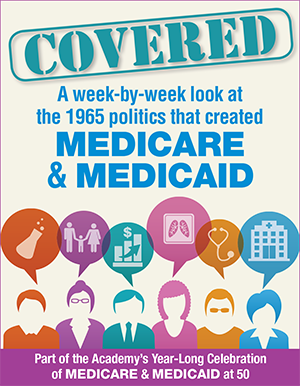Bob Rosenblatt, Special Correspondent
Welcome to Covered: A Week-by-Week Look at the 1965 Politics that Created Medicare and Medicaid. Bob Rosenblatt, a Senior Fellow at the National Academy of Social Insurance, former Los Angeles Times Washington correspondent, and editor of the website HelpWithAging will blog on the maneuvers that led to the enactment of Medicare and Medicaid on July 30th, 1965 the first major expansion of U.S. social insurance to health care.
Medicare Program Clears Major Hurdle with Approval by House Committee
March 27, 1965
By Bob Rosenblatt, Special Correspondent
Washington, D.C. – In a historic vote, this week the House Ways and Means Committee approved the establishment of a new program that would ensure access to basic health care for approximately 20 million Americans over the age of 65. The new program, called Medicare, would be a massive expansion of the federal government’s role in guaranteeing access to basic types of health care. It would be the largest new program of contributory payments by workers and government-directed benefits for older Americans since the creation of Social Security 35 years ago.
If approved by Congress, the new Medicare program would also be a major political victory for President Johnson and the liberal majority that took control of Congress after the 1964 landslide election. The committee approved the bill in a party line vote, with 17 Democrats in favor and eight Republicans opposed.
The bill is a the result of a surprising legislative and political maneuver by Committee Chairman Wilbur Mills (D-AR), who incorporated the Administration’s Medicare proposal several into rival proposals offered by House Republicans. Dubbed the “three-layer cake”, the final proposal contains:
- A hospital insurance program for people over the age 65 financed under the Social Security system. Individuals would pay $40 for the first day in the hospital but fully covered for the next 59-days. The program would also cover 20-days of nursing home rehabilitation care if needed after a hospital stay, with a maximum of 100-days in any one year. Individuals who need it would be able to get home care from a licensed health care professional (a doctor or a nurse or physical therapist).
- A voluntary program of insurance to pay for most of the cost to a doctor’s office. Premiums would be $6/month, with half of that paid by the individual and half paid by the federal government out of general revenues. Participating individuals would also pay a $50 deductible each year and a 20 percent copayment outpatient care; the insurance would pay the other 80 percent.
- An expansion of Kerr-Mills to increase federal assistance to the states to cover more of the medical bills of millions of poor and disabled children and adults. To date, Kerr-Mills has fallen short of its promise, with only 248,000 Americans covered, compared to projections of two million people when the program was created.
Passage of the bill in this committee is a major turn-around for President Johnson, who saw Chairman Mills effectively scuttle the health plans of the last two administrations. Mills had been opposed to the Medicare approach for years, but extensive private talks with Johnson and the results of the election persuaded this key congressional player that passage of a bill would become inevitable.
Now, the President, with his secret ally and confidant, is urging other legislative leaders to move the measure to a fast final passage. In a private call after the March 23 vote in committee, the President told Mills, House Speaker John McCormack (D-MA), and Majority Leader Carl Albert (D-OK) to press for speedy passage. “For God’s sake, don’t let dead cats stand on your porch,” Johnson said, giving a vivid analogy of legislation being ignored. “Mr. [Sam] Rayburn (former House Speaker) used to say, ‘they stink and they stink and they stink.” Johnson told them, “When you get one [of your bills] out of your committee, you call that son of a bitch up before [the opposition] can get their letters written.”
The bill would cost the federal government $5.5 billion in the first year of operations, scheduled to begin July 1, 1966.
The proposed legislation also calls for a 7 percent raise in retirement benefits for 20 million people enrolled in Social Security. Each beneficiary would get a raise of at least $4 a month. Widows and widowers would be allowed to start drawing benefits at age 60 from the account of a deceased spouse. The children of deceased workers, who had been drawing dependent benefits through high school graduation age, will now be allowed to collect benefits through age 22 if they are attending college.
President Johnson and liberal Democratic leaders in Congress will now be pushing hard to move the bill to final passage before opponents, such as important fiscal conservatives in the Senate, outside business groups, or physicians can mount any effective delaying tactics.
► Directory of COVERED posts
► Read the next post in the COVERED series, “Millions of Kids to Get Health Care Access Under House Medicare Bill”
► Learn more about the Academy’s celebration of the 50th anniversary of the enactment of Medicare and Medicaid

